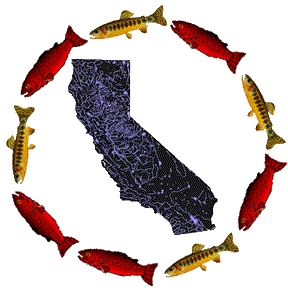CSPA |
| Your 501(c)(3) tax deductible cash donations are desperately needed if the fight for our fisheries is to continue. Read how you can donate! |

 More News
More News
![]()
Schwarzenegger Gushes about Low Carbon Fuel Standards as He Pushes Canal Without Public Approval or Legislative Consent
by Dan Bacher, editor of the FishSnifferJanuary 6, 2009 -- In yet another egregious display of green washing, Governor Arnold Schwarzenegger commended 11 Eastern states for agreeing to a low carbon fuel standards as he plans the construction of a peripheral canal that will destroy the ecosystem of the California Delta, the largest estuary on the coast of the Americas.
“I applaud these 11 Eastern states for recognizing the power of California’s groundbreaking low carbon fuel standard (LCFS) to reduce greenhouse gas emissions and oil dependency while rewarding innovation and expanding consumer choice," Schwarzenegger said on Monday, January 5. "Like California, these other states are leading the way in recognizing that we must take action now to fight global warming, and I look forward to working together to find additional solutions like the LCFS that both protect our environment and grow our economy at the same time.”
In contrast to the "Green Governor" role Schwarzenegger played Monday, his handpicked cabinet level Delta Vision Committee on Friday released its plan to break ground on an environmentally devastating and obscenely expensive peripheral canal by 2011.
Governor Arnold Schwarzenegger is pushing for his canal as a monument to his gigantic ego at a time when Central Valley chinook salmon, Delta smelt, longfin smelt, threadfin shad and striped bass are in a state of collapse. The collapse of these fish species is the result of massive increases in water exports from the Delta and declining water quality under the Schwarzenegger and Bush administrations. The canal will create the infrastructure for the state and federal governments to export even more water from the Delta and only exacerbate the already imperiled state of Delta fish populations. For more information, go to http://www.indybay.org/newsitems/2009/01/03/18558107.php or http://www.indybay.org/newsitems/2009/01/05/18558773.php
Meanwhile, a new economic report released by NOAA’s Fisheries Service says that U.S. commercial and recreational fishing generated more than $185 billion in sales and supported more than two million jobs in 2006. California's commercial and recreational fisheries, industries that depend on the health of the Bay-Delta Estuary, figured prominently in the report's break down of the sales, income and job figures for each coastal state. In his mad drive to build a peripheral canal, Schwarzenegger is favoring one industry, subsidized agribusiness on the west side of the San Joaquin Valley, over Delta agriculture and California's commercial and recreational fisheries.
The highest amount of sales generated by the commercial fishing industry were in California ($9.8 billion), Florida ($5.2 billion), Massachusetts ($4.4 billion), Washington ($3.8 billion), and Alaska ($3 billion). The most jobs were generated in California (179,000), Florida (103,000), Massachusetts (83,000), Washington (75,000) and Texas (47,000).
Recreational fishing generated its highest economic effect in total sales and jobs generated in Florida ($7.6 billion sales, 131,000 jobs); Texas ($2.2 billion sales, 34,000 jobs); California ($1.9 billion sales, 23,000 jobs); North Carolina ($1.2 billion sales, 24,000 jobs); and Louisiana ($1.2 billion sales, 27,000 jobs).
The commercial fishing industry—harvesters, seafood processors and dealers, seafood wholesalers and seafood retailers—generated $103 billion in sales, $44 billion in income and supported 1.5 million jobs in 2006, the most recent year included in the report, Fisheries Economics of the United States, 2006, which covers 1997 to 2006. Recreational fishing generated $82 billion in sales, $24 billion in income, and supported 534,000 jobs in 2006.
“The report documents clearly that managing fisheries sustainably is good for the environment and the economy,” said Jim Balsiger, NOAA acting assistant administrator for NOAA’s Fisheries Service. “Fishing helps create a substantial number of jobs around the nation.”
The report is the first volume in a new series designed to give the public accessible economic information on fishing activities in the U.S., and is a companion to Fisheries of the United States, and the forthcoming Fishing Communities of the United States. The report also provides a snapshot of fishery management plans, limited access privilege fishing programs (a type of catch share program), buyback programs, and ecolabeling programs as well as the status of fish stocks and an inventory of protected marine resources.
Fisheries Economics of the United States, 2006 is available online at: http://www.st.nmfs.noaa.gov/st5/index.html Hard copies of the report are forthcoming.
Governor Schwarzenegger and his Delta Vision Committee should carefully review this report before proceeding with their plan to build a peripheral canal and more dams.